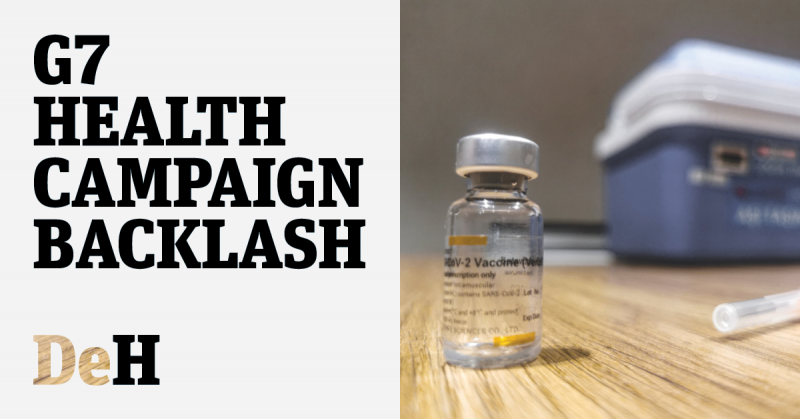
From vaccine equity to climate change, last weekend international leaders met in Cornwall for the G7 Summit to discuss high-profile global issues. Rachel Lygoe explores the three biggest issues for the health sector post-Cornwall.
Vaccine pledges may not be enough
Unsurprisingly vaccines were at the forefront of the agenda, with leaders pledging their commitment to support COVAX, strengthen supply chains and boost vaccine manufacturing capacity. Leaders committed to provide at 1 billion vaccines to poorer countries over the next year, with at least half donated by the end of 2021 via COVAX.
However, organisations and politicians alike have slammed leaders for failing to do enough, arguing that the pledges fall significantly short of the 11 billion doses required to curb the virus across the world.
Moreover, the pledge to donate 1 billion doses isn’t actually all that it seems – the figure includes donations made since February 2021. Despite the headlines, just 870 million doses will be directly shared.
Amnesty International called the pledges a “drop in the ocean”, given that it will take the poorest countries another 50 years to vaccinate their populations at current rates. Oxfam went even further, describing the summit as one that would “live on in infamy” due to leaders failing to agree a clear plan to vaccinate the majority of the world’s population.
Meanwhile, former Prime Minister Gordon Brown criticised leaders for “passing the begging bowl round” rather than agreeing a comprehensive plan.
A cross-party group of MPs also warned that the UK Government’s pledge to donate 100 million doses by the end of 2022 risks coming too late, while Labour questioned the lack of a sustainable, fully-funded strategy.
The Prime Minister has rejected claims of failure and argued the G7 group were “going flat out” to produce and distribute vaccines. None the less, the WHO issued the stark warning that the virus is moving faster than the global distribution of vaccines – reminding leaders that the pandemic is far from over.
Battle over IP rights continues
In other news, French President Emmanuel Macron expressed support for a temporary waiver on IP rights for covid-19 vaccines, tweeting that “it was up to the G7 to get involved” on dose sharing, opening up of intellectual property and financing of health systems.
IP rights have been an issue since October 2020, when India and South Africa submitted a proposal to the WTO seeking a temporary waiver on IP rights on covid-related products. The proposal is supported by more than 120 nations and, in a move which is said to have blindsided the pharmaceutical industry, was recently backed by the Biden Administration. The proposal is contentious, with the pharmaceutical industry warning that it would be counterproductive and could impact future vaccines and medicines investment.
Macron’s support reflects the growing divide among the G7. Both UK and Germany have rejected the proposal, with Boris Johnson instead calling for individual countries to secure low-cost commitments from vaccine suppliers, as the UK did with AstraZeneca. This may be the only thing the UK and EU Commission agree on this year, although the EU Parliament has backed an amendment in support.
Tedros Adhanom Ghebreyesus, WHO director-general, said a temporary waiver of IP was “essential” to achieve the WHO’s target of vaccinating 70% of the world’s population by next year’s G7 summit.
In a final communique, G7 leaders stated they would “engage constructively” with discussions at the WTO on the role of IP.
Government under fire again for ODA cuts
There was some good news at the G7 summit on antimicrobial resistance (AMR). AMR, which is often labelled the “silent pandemic”, remains one of the biggest global health threats. Concerns have been compounded by research suggesting that antibiotic use has increased throughout the pandemic.
The issue was high on the agenda and discussed at the G7 by both Health and Finance Ministers. In a welcome move, the latter pledged to explore proposals for strengthening market incentives for antibiotic drug development to bring new antimicrobials to market.
However, the UK has come under fire for going into the G7 with “mixed messages”. Its pledge of support for antibiotic incentive schemes is at odds with recent cut to the ODA budget, which will cut millions of pounds for global public health research and activities.
Anything else?
Before the summit was even over, it was described as a “colossal failure” that failed to take any real, meaningful action. Although in reality the sharing of vaccine doses will lessen the burden of the pandemic on low and middle-income countries, the pledge was lambasted for misrepresenting the true number of new doses. Even singer Selena Gomez said the UK’s pledge of 5 million doses by September was “too little too late”.
The summit was also largely characterised by continued tensions over the Northern Ireland protocol. Despite Mr Johnson’s claim that the US and UK were in “complete harmony”, it has been reported that President Biden held a “candid discussion” in which he urged the Prime Minister to ensure the protection of the Northern Ireland peace process.
